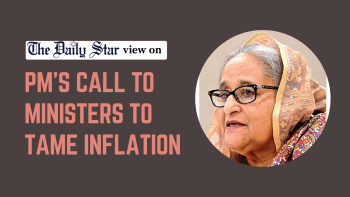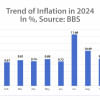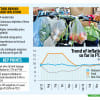Why are food prices still rising?

A home ministry report has confirmed what we have been saying in this column for some time now—that even though there is currently no supply shortage in the country, a section of unscrupulous importers and traders are creating an artificial crisis and increasing the prices of essentials. This trend of raising prices, the report warned, may have an adverse impact during Ramadan—when prices are typically hiked almost every year anyway, using different excuses. With food and the overall inflation already at near record levels, and with traders raising food prices again already before Ramadan, how will the general public manage once the month of fasting arrives and prices are increased again?
According to an earlier World Bank report, published in December last year, rising food prices have become a concern for 71 percent of families in Bangladesh. That number will only continue to soar given the current trend. If we compare the current prices of some basic items such as sugar, chickpeas, coarse rice, dates and local onions with what their prices were a year ago, we can clearly see that the price of every single one of them has gone up substantially—with the price of some items even doubling. Analysing the opening of the Letters of Credit (LCs) of various products from July to December 2022 and 2023, the home ministry report said fewer LCs were opened for items such as soybean oil, palm oil, sugar, lentils, chickpeas and dates compared to the previous year. However, that rate increased this January, centring the month of Ramadan. As such, if the LC goods are offloaded at the right time, there should be "no supply shortage," it said.
So, the recent price hike can only be attributable to the dishonest activities of traders and importers, which play a big role in the price hikes of goods, primarily due to scare competition in the import market. This situation did not occur overnight. The fact that the government has been unable to make any inroads into increasing competition—and thereby reducing the collusive power of syndicates—is extremely disappointing and is one of the main reasons for people's sufferings.
Some traders have also alleged that extortion in transporting goods is another reason for high prices. The fact that this problem, too, has persisted for years points to another massive government failure. The home ministry report gave a number of recommendations such as involving more importers in the import process to prevent syndication among certain business groups, removing complexities related to opening LCs, etc, all of which we have mentioned before. It is time for the government to seriously implement these solutions and bring an end to such unjustified price hikes.


 For all latest news, follow The Daily Star's Google News channel.
For all latest news, follow The Daily Star's Google News channel. 









Comments